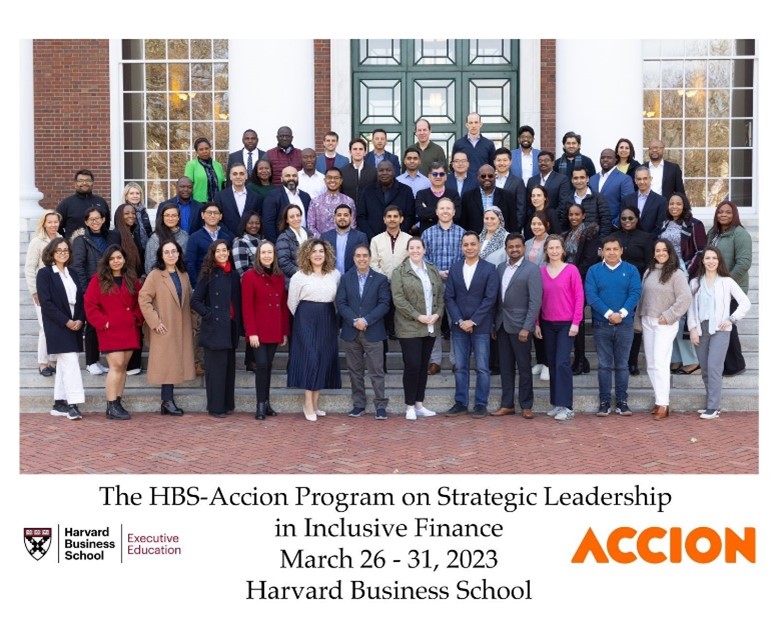
I made it! Despite a delayed arrival in Paris from Luxembourg, despite a required change of aircraft, a strike and missing catering on board at Charles de Gaulle airport, as well as missing luggage for the first 4 days, did I finally arrive at Harvard Business School (HBS) in Cambridge, Massachusetts for this exciting six-day training.
I was lucky enough to be selected for an InFiNe scholarship to the Accion-Harvard Business School course in Strategic Leadership in Inclusive Finance. The course, in its 17th edition, is sponsored by Accion International, the US-based international Non-Governmental Organisation (NGO) that seeks to “harness the power of digital technology” to increase financial inclusion via investments, advisory services, partnerships and much more. Briefly after arrival, we had our first session…
With whom did I participate? For this course at HBS, I am part of 65 very diverse participants from all continents, uniting regulators and policy makers (8%), financial-institution executives (40%), representatives from NGOs (22%), fintech companies (17%), investors (8%), and others (5%).
Many are somehow related to Accion, e.g. representatives from Mastercard and FMO as partners of the NGO, investees from Accion such as BancoSol, Ugafode, Nothern Arc, and others. And there are even two African clients of the EIB participating!
The course is run by two co-chairs, Michael Chu, a senior lecturer at Harvard Business School, and also guess what? … an ex CEO of Accion International, and Harvard Business School Marketing Professor Kash Rangan (not related to Accion J). Besides these co-chairs of the course, there are additional 5 faculty members engaging with participants and stirring their discussions.
I felt taken back to my time at CGAP when I, as part of CGAP`s Technology Team, was discussing and imagining new business models, like agent networks or mobile money platforms to reach the financially excluded.
What did I learn or discuss? As mentioned, the 6-day course circles around 5 main topics, namely “The Inclusive Finance Landscape”, the “Role of Regulation”, “Fintech&Investing”, “Data/Measurement and Implications” and “Reflections & Future”. The relating discussions are normally based on a case study for which sometimes even the relevant CEO or founder is invited to discuss with the group and answer any questions.
With the course already running for 17 years, already 900 participants have enjoyed this week of studies, exciting lectures, presentations, and in-depth exchange among participants!
The course that I enjoyed the most was on Wednesday (maybe also because my jet lag was finally wearing off). It was a study on a company analysing the hypothesis that comparing your energy consumption with that one of your neighbours would have you reduce your own consumption. By simply sending people their monthly or quarterly energy consumption and adding the one of your neighbourhood, you could observe three things: i) simply sending the reports would already reduce consumption, ii) the reduction would wear off after 4 months, i.e. no further reduction would be observed after that period, and iii) if the regular sending of reports was interrupted, households would slowly increase consumption to the initial level again.
That`s interesting, non? i.e. reducing energy consumption does not be expensive. Just tell us that others are reducing theirs and we will follow.
Thank you very much to InFiNe and EIB Global for this opportunity!
This article was written by Hannah Siedek, Senior Investment Officer at the European Investment Bank, as part of the InFiNe.lu scholarship she was granted to attend the Accion – Harvard Business School Strategic Leadership in Inclusive Finance programme.
InFiNe is the Luxembourg platform that brings together public, private and civil society actors involved in inclusive finance. The value of InFiNe lies in the wide range of expertise characterised by the diversity of its members.
With the support of

Inclusive Finance Network Luxembourg
39, rue Glesener
L-1631 Luxembourg
G.-D. de Luxembourg
Tel: +352 28 37 15 09
contact@infine.lu
R.C.S. : F 9956
Legal notice
Privacy notice
Picture 1 © Pallab Seth
